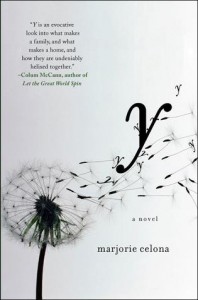Marjorie Celona’s debut novel, Y, documents the childhood of Shannon, an orphan left at birth on the steps of Vancouver Island’s YMCA, as she is tossed, Odysseus-like, into various family-like structures, seeking the home she’s been missing and the fulfillment of the maternal gap in her life. The story’s structure, mirroring the novel’s title, presents two narratives leaning toward each other with an inevitable intersection. The chapters alternate between the orphanhood of young Shannon and the moments in her mother’s life leading up to Shannon’s birth and abandonment. That Shannon will meet her mother again is inevitable, since both stories are narrated in her voice, but the less assured reconciliation of her desire for stability gives Celona’s story a perpetual, if tempered, tension, and a sense of many possibilities branching out.
Because, like a Victorian romance, the story’s conclusion is at least somewhat secure, Y succeeds on the observations and descriptions of the protagonist — a curly-headed blond with one blind eye — as she comes up against both the social and physical boundaries of her island home. Shannon’s precocious omniscience keeps her at a defensive distance from the disruptive characters she meets on her wanderings, including her somewhat abusive foster father of earlier days. And, possibly because she sees herself (as do others) as one of these outcasts, her emotional reactions to both affirming and dangerous circumstances can be disturbingly sparse, an attitude which strangely never gets reconciled.
Instead of emotional response, we get lists of observations and records of life. Here Celona’s style is charming. “A woman is standing in front of a cathedral with a basket in her hands,” Shannon declares:
She looks up and down Quadra as if she’s waiting for someone. But she’s not that interesting, so I run my hands over a yew hedge, kick a couple of dead rhododendron flowers off the bottom of my shoes — rhododendrons are the ugliest flowers in the world.
There is something both relevant and poignant in this quotidian observation which captures the protagonist’s more substantial feelings: a sense of loss both physical and spiritual. And that is how the book works on you, quite beautifully, in the layering of experience and observed detail. The emphasis on this external richness recalls Shannon’s emotional void. Significantly, her attitude to the world does not change, even when she is face-to-face with the potential for emotional fulfillment: her long-sought-after mother.
Despite the protagonist’s coolness, the novel does seem particularly well-suited for readers in need of a sympathetic and adventurous literary counterpart. It deals soul-searchingly with traditional elements of young adulthood — drugs, friends, family, self-loathing — all couched in clear prose. Y is indeed compassionately told, and often moving. The impediments of a debut author are, however, most visible in Celona’s need for extremity on this front. After all, did our heroine have to be half-blind to be a sympathetic outsider? The pathos, especially of the story of Yula, Shannon’s mother, can get to be a little much at times, as if every nightmare which plagues the minds of suburban mothers (“It’s 10:00. Do you know where your children are?”) is being fulfilled. Overwhelming tragedy may not be necessary to justify the novel.
As Celona continues to write, I hope that she begins to rely more on her characters to drive the story — which well she can — and that her plots will loosen up to allow for more subtle discussions of the travesties and lightness of human existence, which still at many points shine through in her first novel.
This post may contain affiliate links.









